Mutation of the Human Circadian Clock Gene CRY1 in Familial Delayed Sleep Phase Disorder
- PMID: 28388406
- PMCID: PMC5479574
- DOI: 10.1016/j.cell.2017.03.027
Mutation of the Human Circadian Clock Gene CRY1 in Familial Delayed Sleep Phase Disorder
Abstract
Patterns of daily human activity are controlled by an intrinsic circadian clock that promotes ∼24 hr rhythms in many behavioral and physiological processes. This system is altered in delayed sleep phase disorder (DSPD), a common form of insomnia in which sleep episodes are shifted to later times misaligned with the societal norm. Here, we report a hereditary form of DSPD associated with a dominant coding variation in the core circadian clock gene CRY1, which creates a transcriptional inhibitor with enhanced affinity for circadian activator proteins Clock and Bmal1. This gain-of-function CRY1 variant causes reduced expression of key transcriptional targets and lengthens the period of circadian molecular rhythms, providing a mechanistic link to DSPD symptoms. The allele has a frequency of up to 0.6%, and reverse phenotyping of unrelated families corroborates late and/or fragmented sleep patterns in carriers, suggesting that it affects sleep behavior in a sizeable portion of the human population.
Keywords: DSPD; circadian clock; circadian rhythm; sleep.
Copyright © 2017 Elsevier Inc. All rights reserved.
Figures


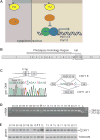
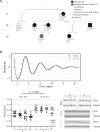
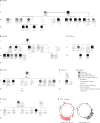
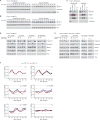
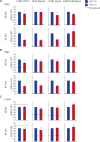
References
-
- American Academy of Sleep Medicine. International Classification of Sleep Disorders: Diagnostic and Coding Manual. 2. Westchester, Illinois: American Academy of Sleep Medicine; 2005.
-
- Aoki H, Ozeki Y, Yamada N. Hypersensitivity of melatonin suppression in response to light in patients with delayed sleep phase syndrome. Chronobiol Int. 2001;18:263–271. - PubMed
-
- Archer SN, Robilliard DL, Skene DJ, Smits M, Williams A, Arendt J, von Schantz M. A length polymorphism in the circadian clock gene Per3 is linked to delayed sleep phase syndrome and extreme diurnal preference. Sleep. 2003;26:413–415. - PubMed
-
- Azzi A, Dallmann R, Casserly A, Rehrauer H, Patrignani A, Maier B, Kramer A, Brown SA. Circadian behavior is light-reprogrammed by plastic DNA methylation. Nat Neurosci. 2014;17:377–382. - PubMed
Publication types
MeSH terms
Substances
Grants and funding
LinkOut - more resources
Full Text Sources
Other Literature Sources
Molecular Biology Databases
Research Materials

